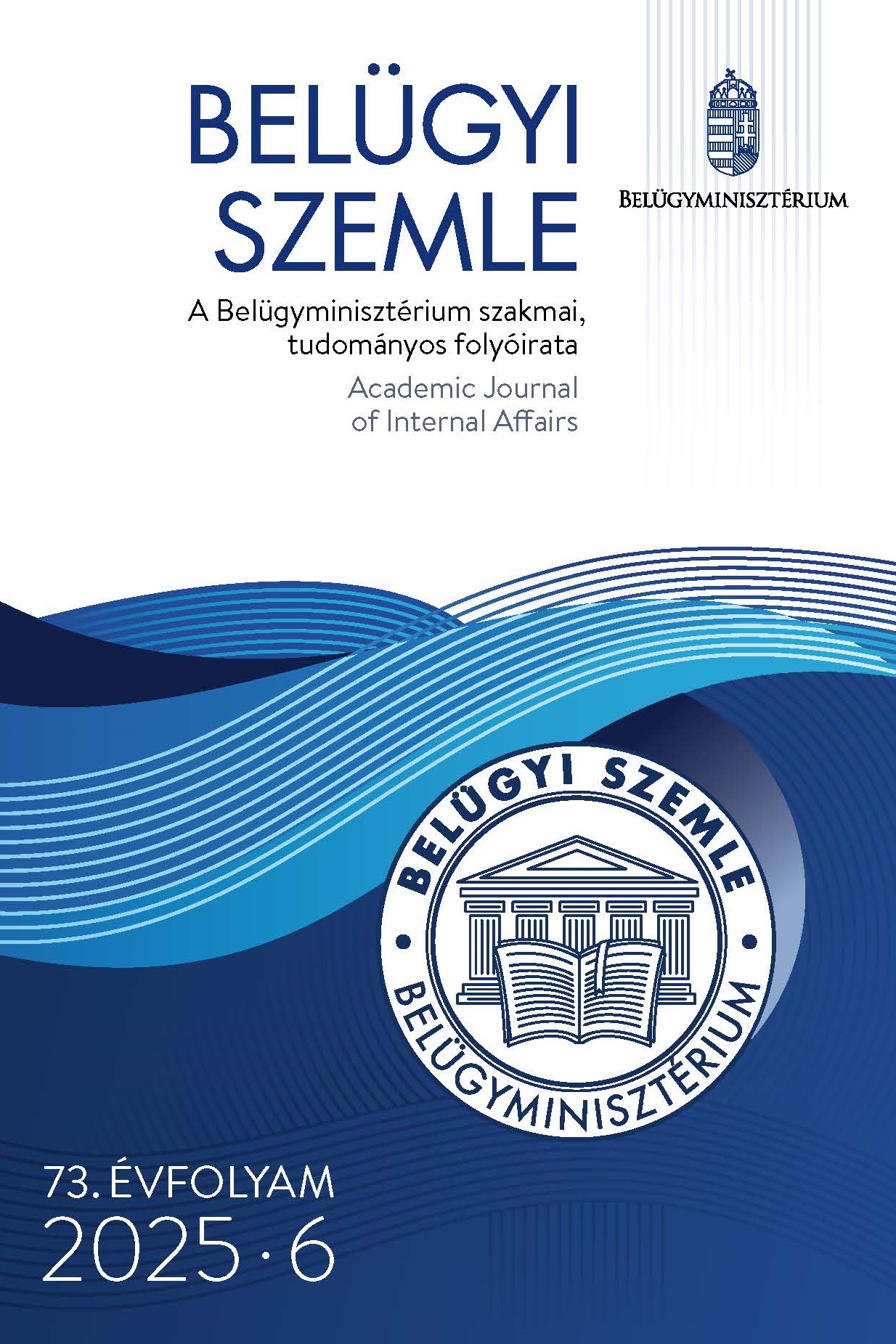Absztrakt
Cél: A figyelő jelen száma egymástól nagyon távol eső témákról ad körképet, de sokszínűség jellemzi az országokat is, ahol ezekre a kutatásokra sor került. A Dél-Afrikai Köztársaság jelentősen eltér attól a társadalmi-gazdasági-kulturális környezettől, ami Azerbajdzsánt jellemzi. A tanulmányok tárgyválasztása sem hozható közös nevezőre. Nehéz lenne kapcsolatot találni a bűnözési félelem és a cannabis legalizálása között, de ezúttal a szerkesztőket nem is ilyen célok vezették. Inkább arra hívják fel az olvasók figyelmét, hogy a nemzetközi példák a kriminológia sokszínűségéről tanúskodnak.
Módszertan: A kutatási metodikák kínálata ezúttal is gazdag. Lippai Zsolt munkája arra figyelmeztet, hogy a családon belüli erőszak terjedésében a hatósági segítségnyújtás és fellépés mellett a magánbiztonság is megtalálhatja a maga szerepét. Bartus Gábor recenziója olyan kriminológiai tanulmányba ad betekintést, ami Anglia és Wales igazságszolgáltatásában kimutatható faji- és etnikai alapú előítéletesség jegyeire mutat.
Megállapítások: Horváth Bíborka tanulmánya arra mutat, hogy a kábítószer zéró toleranciára alapított büntetőjogi tilalmazása mellett felmerülhetnek olyan érvek is, amelyek ennek a szigornak az oldására utalnak, különösen akkor, ha azokat orvosi, egészségügyi és társadalmi tapasztalatok is alátámasztják. András Hunor Lehel ismertetője azeri példával igazolja, hogy a külhoni kutatások gyakran szoros kapcsolatot mutatnak a korábbi hazai tapasztalatokkal, amelyek a bűnözési félelem és az áldozattá válás közötti összefüggéseket jellemzik.
Érték: A kriminológiai indítású tudományos érdeklődés jelentősen hozzájárulhat a bűnmegelőzés hatékonyságának erősítéséhez, a személy- és vagyonbiztonság növeléséhez, az igazságszolgáltatást torzító előítéletesség leküzdéséhez, valamint a segítő-támogató büntetőpolitika térnyeréséhez.
Hivatkozások
Artz, L. (2011). Fear of failure? Why victims of domestic violence retract from the criminal justice process. South African Crime Quarterly, 37, 3–10. https://doi.org/10.17159/2413-3108/2011/v0i37a855
Boda J. (Szerk.). (2019). Rendészettudományi szaklexikon. Dialóg Campus.
Button, M. (2014). State regulation concerning civilian private security services and their contribution to crime prevention and community safety. United Nations.
Committee on the Elimination of Discrimination against Women. (2022). Inquiry concerning South Africa conducted under Article 8 of the Optional Protocol to the Convention. United Nations.
Cools, S., & Kotsadam, A. (2017). Resources and intimate partner violence in sub-Saharan Africa. World Development, 95, 211–230. https://doi.org/10.1016/j.worlddev.2017.02.027
Goodenough, C. (2007). Joining forces against crime: Potential for the private security industry to become proactive. South African Crime Quarterly, 20, 5–12. https://doi.org/10.17159/2413-3108/2007/v0i20a973
Harrison, O. (2021). The long-term effects of domestic violence on children. Children’s Legal Rights Journal, 41(1), 63–67. https://lawecommons.luc.edu/clrj/vol41/iss1/7
Herman, J. L. (2015). Trauma and recovery: The aftermath of violence – From domestic abuse to political terror. Basic Books.
Hofmann, R. (2023). The ‘total-legalization’ of cannabis in Germany: Legal challenges and the EU free market conundrum. European Journal of Crime, Criminal Law and Criminal Justice, 31(2), 173–196. https://doi.org/10.1163/15718174-bja10044
Kholofelo, A. R., & Tirivangasi, H. M. (2022). Police capacity building in dealing with domestic violence cases in South Africa: An entry point to women’s access to justice. In E. C. Lubaale & A. Budoo-Scholtz (Eds.), Violence against women and criminal justice in Africa (pp. 123–147). Springer Nature. https://doi.org/10.1007/978-3-030-75949-0_5
Központi Statisztikai Hivatal. (n.d.). Regisztrált sértettek, sértetté válások adatai. https://www.ksh.hu/stadat_files/iga/hu/iga0005.html
Lawson, J. (2012). Sociological theories of intimate partner violence. Journal of Human Behavior in the Social Environment, 22(5), 572–590. https://doi.org/10.1080/10911359.2011.598748
Mathews, S., & Abrahams, N. (2001). Combining stories and numbers: An analysis of the impact of the Domestic Violence Act (No. 116 of 1998) on women. Gender Advocacy Programme & Medical Research Council.
Minnaar, A. (2004). Crime prevention, partnership policing and the growth of private security: The South African experience. In G. Meško, M. Pagon & B. Dobovšek (Eds.), Policing in Central and Eastern Europe – Dilemmas of Contemporary Criminal Justice (pp. 23–25). Faculty of Criminal Justice, University of Maribor. https://www.ojp.gov/pdffiles1/nij/Mesko/207977.pdf
Molebeleli, L. B. (2018). A cooperative government approach to domestic violence: The case of SAPS, Ikageng and the North West Department of Justice and Constitutional Development (Master's dissertation). North-West University, South Africa.
Mshweshwe, L. (2020). Understanding domestic violence: Masculinity, culture, traditions. Heliyon, 6(10), e05334. https://doi.org/10.1016/j.heliyon.2020.e05334
Murphy-Oikonen, J., McQueen, K., Miller, A., Chambers, L. & Hiebert, A. (2022). Unfounded sexual assault: Women’s experiences of not being believed by the police. Journal of Interpersonal Violence, 37(11–12), 8916–8940. https://doi.org/10.1177/0886260520978190
Oeschger, S., Nunlall-Hiralal, R. & Steyn, F. (2024). Disrupting gender-based violence: The role of private security. Community Psychology in Global Perspective, 10(1/2), 137–156.
Pingley, T. (2017). The impact of witnessing domestic violence on children: A systematic review (Master's dissertation). St. Catherine University, Minnesota.
Private Security Industry Regulatory Authority. (2023). Annual performance plan 2023/24. https://www.psira.co.za/dmdocuments/PSiRA%20-%20Annual%20Performance%20Plan%202023-24%20Final_new.pdf
Snodgrass, L. (2016). The sins of the father: Gender-based violence in post-apartheid South Africa. Commonwealth Youth and Development, 14(2), 57–70. https://doi.org/10.25159/1727-7140/1798
South African Police Services. (2022). Speaking notes developed by Police Minister General Bheki Cele (MP) at the release of the quarter two crime statistics 2022/2023. https://www.gov.za/news/speeches/minister-general-bheki-cele-quarter-two-crime-statistics-202223-23-nov-2022
Speranza, A. M., Farina, B., Bossa, C., Fortunato, A., Vergano, C. M., Palmiero, L., Quintigliano, M., & Liotti, M. (2022). The role of complex trauma and attachment patterns in intimate partner violence. Frontiers in Psychology, 12, 769584. https://doi.org/10.3389/fpsyg.2021.769584
Troisi, G., & Cesàro, A. N. (2021). Post-traumatic affects and intimate partner violence: An interpretative phenomenological analysis. Mediterranean Journal of Clinical Psychology, 9(1), 1–20.
Veiga, A., Pina-Sánchez, J., & Lewis, S. (2023). Racial and ethnic disparities in sentencing: What do we know, and where should we go? The Howard Journal of Crime and Justice, 62(2), 167–182. https://doi.org/10.1111/hojo.12496
Wantenaar, A. A., & Govender, D. (2023). Experiences of community police forum members in liaison with SAPS, private security, and community members regarding community policing. African Security Review, 32(4), 458–472. https://doi.org/10.1080/10246029.2023.2248095

This work is licensed under a Creative Commons Attribution-NonCommercial-NoDerivatives 4.0 International License.
Copyright (c) 2025 Belügyi Szemle

